高三虚拟语气经典讲解
- 格式:ppt
- 大小:515.50 KB
- 文档页数:29
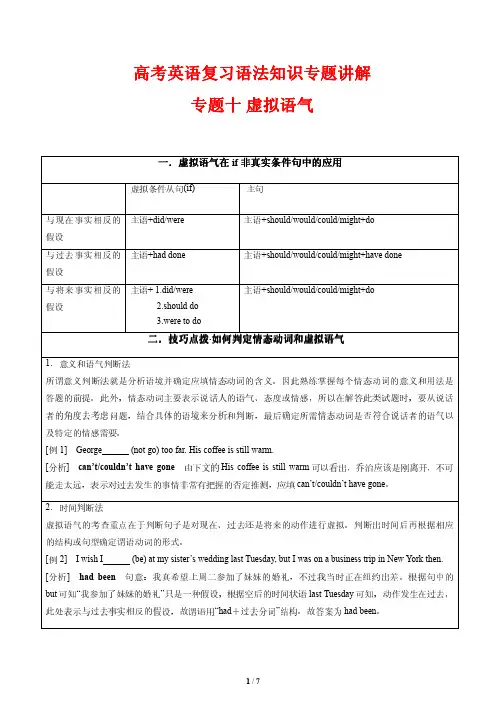
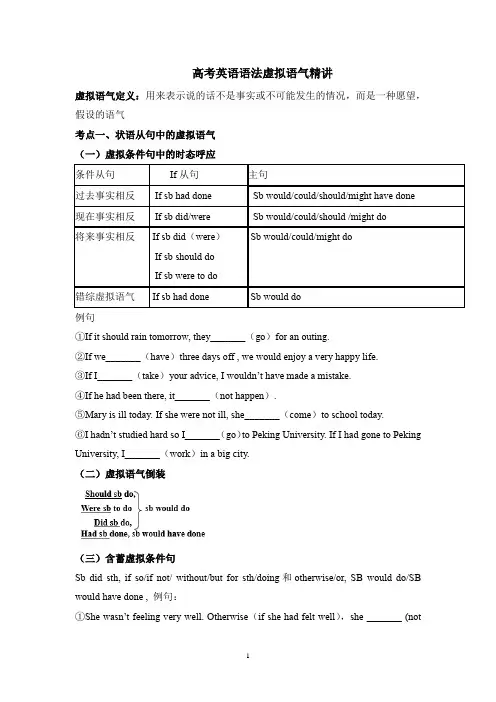
高考英语语法虚拟语气精讲虚拟语气定义:用来表示说的话不是事实或不可能发生的情况,而是一种愿望,假设的语气考点一、状语从句中的虚拟语气(一)虚拟条件句中的时态呼应例句①If it should rain tomorrow, they_______(go)for an outing.②If we_______(have)three days off , we would enjoy a very happy life.③If I_______(take)your advice, I wouldn’t have made a mistake.④If he had been there, it_______(not happen).⑤Mary is ill today. If she were not ill, she_______(come)to school today.⑥I hadn’t studied hard so I_______(go)to Peking University. If I had gone to Peking University, I_______(work)in a big city.(二)虚拟语气倒装(三)含蓄虚拟条件句Sb did sth, if so/if not/ without/but for sth/doing和otherwise/or, SB would do/SB would have done , 例句:①She wasn’t feeling very well. Otherwise(if she had felt well),she _______ (notleave) the meeting so early.②But for your help(if you hadn’t helped me),I_______ (not finish) the work.③Without sunlight (if there were no sunlight), people’s life_______ (be) different from today.(四)as if状语/表语从句例句:①They talked as if they _______ (be)friends for years.②It seems as if it_______ (be) spring.考点二、名词性从句中的虚拟语气(一)宾语从句中的虚拟语气(1)表示要求,命令,建议的宾语从句一个坚持, insist两个命令, order, command四个建议, advise, suggest, propose,recommend五个要求, demand , require, request, desire, urge句式:sb suggest that sb (should) do例句:①The king ordered that the prisoners_______(kill)the next day.②They requested that we_______ (send) them to work there.③He insisted that I_______ (be) present.④We suggested that Tom_______(have)a rest.(2)表示“愿望”例句:①I would rather you_______ (return) the book yesterday.②I would rather you_______ (post) the letter right away.③If only I_______(can)see him again!④If only we_______(follow)your advice!⑤We wish our parents_______ (not punish) us.⑥I wish I (be)a bird.(现在)⑦I wish I (make) such a mistake.(二)主语从句中的虚拟语气(1)It is suggested, requested, ordered,proposed, demanded, advised, requreed that sb (should) do…例句:①It’s suggested that the plan_______ (carry)out.②It’s suggested that everybody_______ (buy)a dictionary.③It’s required that nobody_______ (smoke)here.(2)It’s necessary /strange/important /natural that sb should do……例句:①It is strange that she_______ (refuse)to come to the party.②It is important that we_______ ( master) a foreign language.(3)It is a pity/a shame/ no wonder that sb (should) do…例句:①It is a shame that little children_______(have)to beg in the street.②It is no wonder that she_______(not write)to you.(三)表语从句、同位语从句中的虚拟语气suggestion, proposal, requirement, order, advice , decision that sb should do ……suggestion, proposal, requirement, order, advice , decision is that sb should do ……例句:①My demand is that she_______(come)to see me once a week.②All of us are for the advice that the chemical factory_______(close)down.③He gave advice that they_______(help)each other.④My suggestion is that we_______(leave)at once.考点三、特殊句式的虚拟语气(一)例句:①It’s time that we_______(go)to bed.②It’s time that we_______(go)to bed.(二)should/could/need have done … but didn’t … 翻译“ ” 例句:①There was plenty of time. She_______(not hurry).②You_______(not be)late for yesterday’s class meeting as it was so important.(三)I (intend)to go to Tom’s birthday party, but I was not invited.。
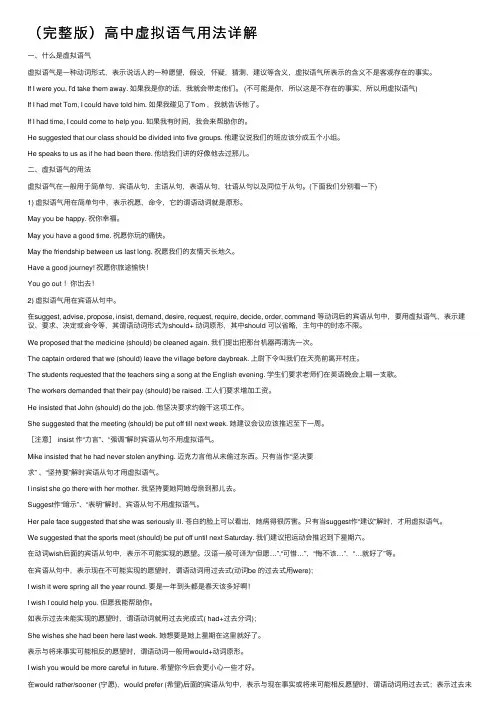
(完整版)⾼中虚拟语⽓⽤法详解⼀、什么是虚拟语⽓虚拟语⽓是⼀种动词形式,表⽰说话⼈的⼀种愿望,假设,怀疑,猜测,建议等含义,虚拟语⽓所表⽰的含义不是客观存在的事实。
If I were you, I'd take them away. 如果我是你的话,我就会带⾛他们。
(不可能是你,所以这是不存在的事实,所以⽤虚拟语⽓)If I had met Tom, I could have told him. 如果我碰见了Tom ,我就告诉他了。
If I had time, I could come to help you. 如果我有时间,我会来帮助你的。
He suggested that our class should be divided into five groups. 他建议说我们的班应该分成五个⼩组。
He speaks to us as if he had been there. 他给我们讲的好像他去过那⼉。
⼆、虚拟语⽓的⽤法虚拟语⽓在⼀般⽤于简单句,宾语从句,主语从句,表语从句,壮语从句以及同位于从句。
(下⾯我们分别看⼀下)1) 虚拟语⽓⽤在简单句中,表⽰祝愿,命令,它的谓语动词就是原形。
May you be happy. 祝你幸福。
May you have a good time. 祝愿你玩的痛快。
May the friendship between us last long. 祝愿我们的友情天长地久。
Have a good journey! 祝愿你旅途愉快!You go out !你出去!2) 虚拟语⽓⽤在宾语从句中。
在suggest, advise, propose, insist, demand, desire, request, require, decide, order, command 等动词后的宾语从句中,要⽤虚拟语⽓,表⽰建议、要求、决定或命令等,其谓语动词形式为should+ 动词原形,其中should 可以省略,主句中的时态不限。
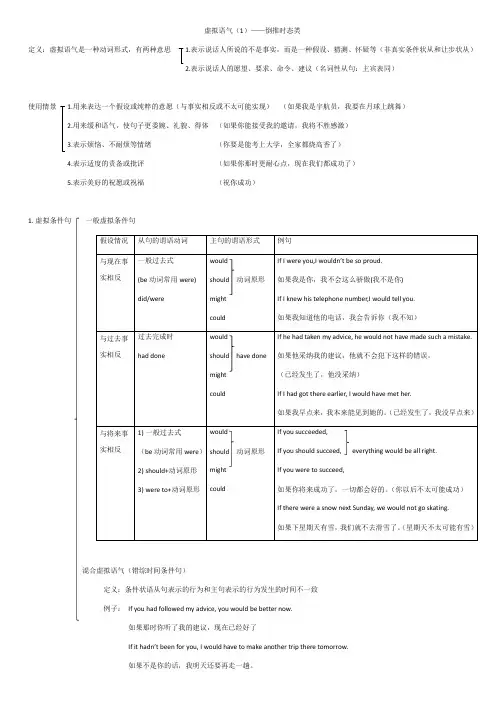
虚拟语气(1)——倒推时态类定义:虚拟语气是一种动词形式,有两种意思 1.表示说话人所说的不是事实,而是一种假设、猜测、怀疑等(非真实条件状从和让步状从)2.表示说话人的愿望、要求、命令、建议(名词性从句:主宾表同)使用情景 1.用来表达一个假设或纯粹的意愿(与事实相反或不太可能实现)(如果我是宇航员,我要在月球上跳舞)2.用来缓和语气,使句子更委婉、礼貌、得体(如果你能接受我的邀请,我将不胜感激)3.表示烦恼、不耐烦等情绪(你要是能考上大学,全家都烧高香了)4.表示适度的责备或批评(如果你那时更耐心点,现在我们都成功了)5.表示美好的祝愿或祝福(祝你成功)1.虚拟条件句一般虚拟条件句混合虚拟语气(错综时间条件句)定义:条件状语从句表示的行为和主句表示的行为发生的时间不一致例子:If you had followed my advice, you would be better now.如果那时你听了我的建议,现在已经好了If it hadn’t been for you, I would have to make another trip there tomorrow.如果不是你的话,我明天还要再走一趟。
If you had studied hard before,you would be a college student now.如果你以前努力学习的话,你现在就是大学生了。
省略+倒装当虚拟条件句的谓语动词中含有were,should,had时,if可以省略,并将were,should,had提前于句首,变为倒装句。
如果虚拟条件句是否定句,not 保留在原处If he should agree to go there, we should send him there.= Should he agree to go there,we should send him there.If she were there,she would agree with us.= Were she were, she would agree with us.If he had learnt about computers,we would have hired him.= Had he learnt about computers,we would have hired him.含蓄虚拟条件句定义:有时为了表达的需要,在虚拟语气中并不总是出现if引导的条件状语从句,而是通过其他手段来代替条件从句分类:1) but for....=(If it+be not for) ;without;Without your help ,we couldn’t have finished the work ahead of time.= But for your help,we couldn’t have finished the work ahead of time.= If it hadn’t been for your help,we couldn’t have finished the work ahead of time.没有你的帮助,我们不可能完成任务。
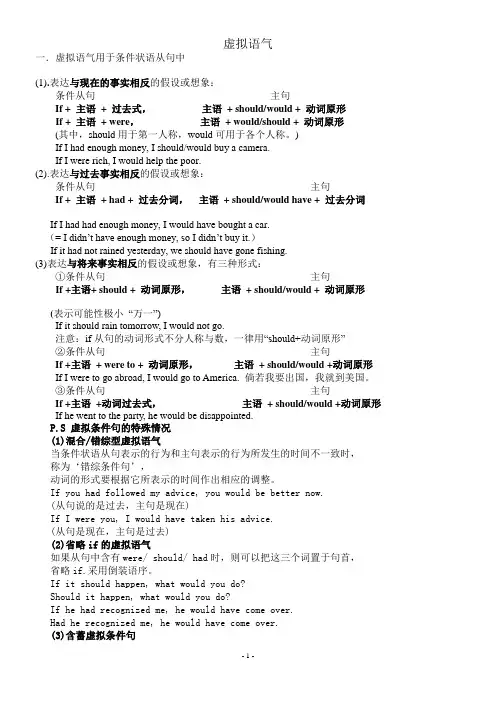
虚拟语气一.虚拟语气用于条件状语从句中(1).表达与现在的事实相反的假设或想象:条件从句主句If + 主语+ 过去式,主语+ should/would + 动词原形If + 主语+ were,主语+ would/should + 动词原形(其中,should用于第一人称,would可用于各个人称。
)If I had enough money, I should/would buy a camera.If I were rich, I would help the poor.(2).表达与过去事实相反的假设或想象:条件从句主句If + 主语+ had + 过去分词,主语+ should/would have + 过去分词If I had had enough money, I would have bought a car.(= I didn’t have enough money, so I didn’t buy it.)If it had not rained yesterday, we should have gone fishing.(3)表达与将来事实相反的假设或想象,有三种形式:①条件从句主句If +主语+ should + 动词原形,主语+ should/would + 动词原形(表示可能性极小“万一”)If it should rain tomorrow, I would not go.注意:if从句的动词形式不分人称与数,一律用“should+动词原形”②条件从句主句If +主语+ were to + 动词原形,主语+ should/would +动词原形If I were to go abroad, I would go to America. 倘若我要出国,我就到美国。
③条件从句主句If +主语+动词过去式,主语+ should/would +动词原形If he went to the party, he would be disappointed.P.S 虚拟条件句的特殊情况(1)混合/错综型虚拟语气当条件状语从句表示的行为和主句表示的行为所发生的时间不一致时,称为‘错综条件句’,动词的形式要根据它所表示的时间作出相应的调整。
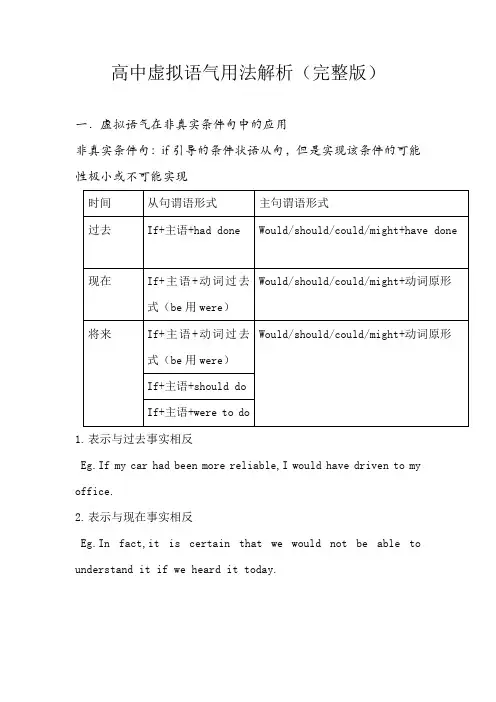
高中虚拟语气用法解析(完整版)一.虚拟语气在非真实条件句中的应用非真实条件句:if引导的条件状语从句,但是实现该条件的可能性极小或不可能实现1.表示与过去事实相反Eg.If my car had been more reliable,I would have driven to my office.2.表示与现在事实相反Eg.In fact,it is certain that we would not be able to understand it if we heard it today.3.表示与将来事实相反Eg.If you succeed,everything would be all right.Grace doesn't want to move to New York because she thinks if she were to live there,she wouldn't be able to see her parents.4.注意事项(1)W as不可以替代were,虚拟语气中,从句中be动词只有were(2)错综时间条件句:条件句的行为和主句行为发生的时间不一致,动词的形式按照主句和从句各自的时间调整。
Eg.If he had listened to me, he would not be in such trouble now. If it had not been raining too much, the crops would be growing much better.(3)虚拟条件句中的谓语动词含有were/ should /had 时,if可省略,而将were/ should /had 置于主语前面Eg.What would have happened had Bob walked farther as far as the river bank?Should he agree to go there, we should send him there. Were it Sunday tomorrow, we should go to the great wall.两个固定搭配:①Were it not for 要不是...就②Had it not been for 要不是...就If it were not for (Were it not for)the bad weather now, we would go to the park to fly kites.If it had not been for(Had it not been for) the bad weather yesterday, we would have gone to the park to fly kites. (4)含蓄虚拟条件句:有时假设的情况不是以if条件句来表示。
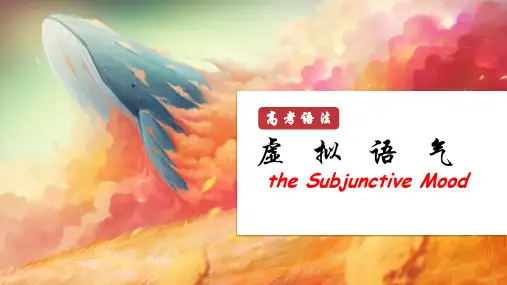
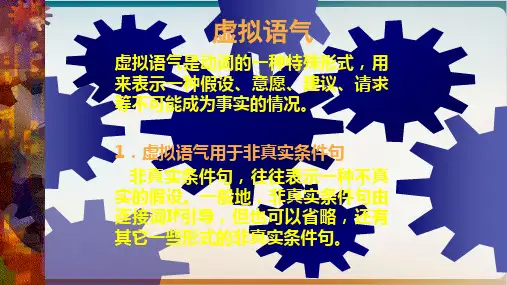
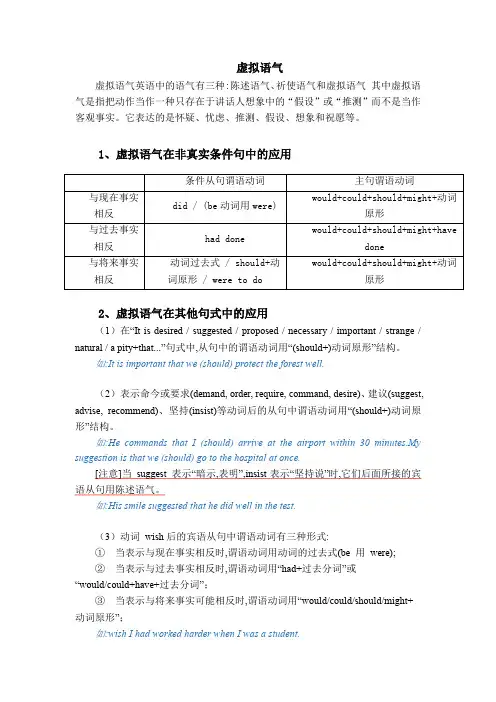
虚拟语气虚拟语气英语中的语气有三种:陈述语气、祈使语气和虚拟语气 其中虚拟语气是指把动作当作一种只存在于讲话人想象中的“假设”或“推测”而不是当作客观事实。
它表达的是怀疑、忧虑、推测、假设、想象和祝愿等。
1、虚拟语气在非真实条件句中的应用2、虚拟语气在其他句式中的应用(1)在“It is desired / suggested / proposed / necessary / important / strange / natural / a pity+that...”句式中,从句中的谓语动词用“(should+)动词原形”结构。
如:It is important that we (should) protect the forest well.(2)表示命今或要求(demand, order, require, command, desire)、建议(suggest, advise, recommend)、坚持(insist)等动词后的从句中谓语动词用“(should+)动词原形”结构。
如:He commands that I (should) arrive at the airport within 30 minutes.My suggestion is that we (should) go to the hospital at once.[注意]当 suggest 表示“暗示,表明”,insist 表示“坚持说”时,它们后面所接的宾语从句用陈述语气。
如:His smile suggested that he did well in the test.(3)动词 wish 后的宾语从句中谓语动词有三种形式:① 当表示与现在事实相反时,谓语动词用动词的过去式(be 用 were); ② 当表示与过去事实相反时,谓语动词用“had+过去分词”或“would/could+have+过去分词”;③ 当表示与将来事实可能相反时,谓语动词用“would/could/should/might+动词原形”;如:wish I had worked harder when I was a student.条件从句谓语动词 主句谓语动词 与现在事实相反did / (be 动词用were) would+could+should+might+动词原形 与过去事实相反had done would+could+should+might+have done 与将来事实相反动词过去式 / should+动词原形 / were to do would+could+should+might+动词原形(4)在as/if/though引导的表语从句或状语从句中,有时可用虚拟语气表示不真实的情况,其谓语动词形式与wish相同。
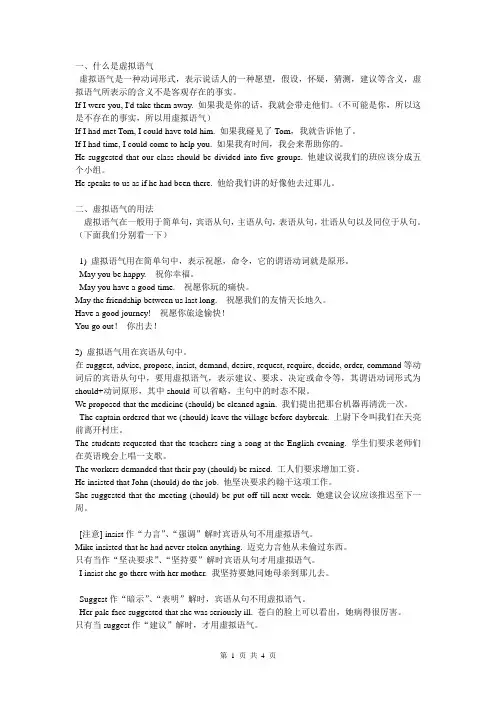
一、什么是虚拟语气虚拟语气是一种动词形式,表示说话人的一种愿望,假设,怀疑,猜测,建议等含义,虚拟语气所表示的含义不是客观存在的事实。
If I were you, I'd take them away. 如果我是你的话,我就会带走他们。
(不可能是你,所以这是不存在的事实,所以用虚拟语气)If I had met Tom, I could have told him. 如果我碰见了Tom,我就告诉他了。
If I had time, I could come to help you. 如果我有时间,我会来帮助你的。
He suggested that our class should be divided into five groups. 他建议说我们的班应该分成五个小组。
He speaks to us as if he had been there. 他给我们讲的好像他去过那儿。
二、虚拟语气的用法虚拟语气在一般用于简单句,宾语从句,主语从句,表语从句,壮语从句以及同位于从句。
(下面我们分别看一下)1) 虚拟语气用在简单句中,表示祝愿,命令,它的谓语动词就是原形。
May you be happy. 祝你幸福。
May you have a good time. 祝愿你玩的痛快。
May the friendship between us last long. 祝愿我们的友情天长地久。
Have a good journey! 祝愿你旅途愉快!You go out!你出去!2) 虚拟语气用在宾语从句中。
在suggest, advise, propose, insist, demand, desire, request, require, decide, order, command等动词后的宾语从句中,要用虚拟语气,表示建议、要求、决定或命令等,其谓语动词形式为should+动词原形,其中should可以省略,主句中的时态不限。
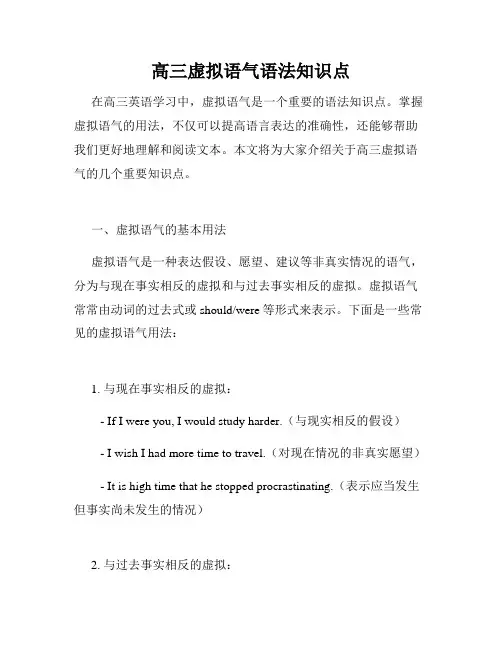
高三虚拟语气语法知识点在高三英语学习中,虚拟语气是一个重要的语法知识点。
掌握虚拟语气的用法,不仅可以提高语言表达的准确性,还能够帮助我们更好地理解和阅读文本。
本文将为大家介绍关于高三虚拟语气的几个重要知识点。
一、虚拟语气的基本用法虚拟语气是一种表达假设、愿望、建议等非真实情况的语气,分为与现在事实相反的虚拟和与过去事实相反的虚拟。
虚拟语气常常由动词的过去式或should/were等形式来表示。
下面是一些常见的虚拟语气用法:1. 与现在事实相反的虚拟:- If I were you, I would study harder.(与现实相反的假设)- I wish I had more time to travel.(对现在情况的非真实愿望) - It is high time that he stopped procrastinating.(表示应当发生但事实尚未发生的情况)2. 与过去事实相反的虚拟:- If he had arrived on time, he would have caught the train.(与现实相反的假设)- I wish I hadn't made that mistake.(对过去情况的非真实愿望) - If I had known, I would have helped you.(对过去未知情况的推测)二、虚拟语气在条件句中的用法虚拟语气经常出现在条件句中,条件句分为三种类型:与现在事实相反的虚拟条件句、与过去事实相反的虚拟条件句和对将来可能情况的虚拟条件句。
下面是对应的用法:1. 与现在事实相反的虚拟条件句:- If he were here, he would help you.(如果他在这里,他会帮助你。
)- If I had a lot of money, I would travel around the world.(如果我有很多钱,我会环游世界。
语法讲解:虚拟语气一、语气的定义和种类l. 语气:语气是动词的一种形式,它表示说话人对某一行为或事情的看法和态度。
2. 语气的种类(1)陈述语气:表示动作或状态是现实的、确定的或符合事实的,用于陈述句、疑问句和某些感叹句。
如:We are not ready. 我们没准备好。
What a fine day it is!多好的天气啊!(2)祈使语气:表示说话人的建议、请求、邀请、命令等。
如:Open the door,please.请打开门。
(3)虚拟语气:表示动作或状态不是客观存在的事实,而是说话人的主观愿望、假设或推测等。
如: If I were you, I should study English. 如果我是你,我就学英语了。
May you succeed!祝您成功!二、虚拟语气在条件从句中的用法条件句有两类,一类是真实条件句,一类是虚拟条件句。
如果假设的情况是有可能发生的,就是真实条件句。
在这种真实条件句中的谓语用陈述语气。
如: If it doesn't rain tomorrow, we will go to the park. 如果明天不下雨,我们就去公园。
如果假设的情况是过去或现在都不存在的,或将来不大可能发生的,则是虚拟条件句。
如: If he had seen you yesterday, he would have asked you about it. 如果他昨天见到你,他会问你这件事的。
(事实上他昨天没见到你,因此也未能问你这件事。
)在含有虚拟条件句的复合句中,主句和从句的谓语都要用虚拟语气。
现将虚拟条件从句和主句的动词形式列表如下:从句主句与现在事实相反动词的过去式(be的过去式一般用were)would/ should/ could/ might + 动词原形与过去事实相反had + 过去分词 would/ should/ could/ might + have + 过去分词与将来事实相反动词过去式,should + 动词原形,were to + 动词原形would/ should/ could/ might + 动词原形注:主句中的should只用于I、we,但在美国英语中,should常被would代替;从句中的should可用于各种人称。
虚拟语气一、考点聚焦1、虚拟语气用于条件状语从句中(1)表示与现在事实相反的假设,条件状语从句中的谓语动词用“过去式(be动词的过去式用were)”,而主句中的谓语动词用“would / should/ could / might + 动词原形”。
如:If I were a boy, I would join the army.If the had time, she should go with you.(2)表示与过去的事实相反,条件状语从句中的谓语动词用过去完成时,主句中的谓语动词则用“would / should / might / could + have +过去分词”。
如:If he had taken my advice, he would have succeeded in the competition.(3)表示与将来事实相反,条件状语从句中的谓语动词一般过去时或should(were to) + 动词原形,而主句中的谓语动词则用would / should/could might + 动词原形。
如;If it were to rain tomorrow, the football match would be put off.(4)当条件状语从句表示的行为和主句表示的行为所发生的时间不一致时,动词的形式要根据它所表示的时间作相应调整。
如:If they had worked hard, they would be very tired.(从句说的是过去,主句指的是现在)Were I a boy, I would join the army.Had he taken my advice, he would have succeeded.Were it not for the expense, I would go to Britain.2、虚拟语气用于名词性从句(1)虚拟语气在宾语从句中的运用。
虚拟语气
知识导图
虚拟语气的定义:虚拟语气表示说话人的某种愿望、假设、怀疑、猜测和建议等,表示的是纯属假设或实现的可能性不大的情况。
虚拟语气是由句中的谓语的特殊形式表现出来的。
虚拟语气的用法
1.虚拟语气用于条件句(条件状语从句)
①条件句的分类
条件句可以分为两种:真实条件句和虚拟条件句。
真实条件句是一种可能实现的条件句,且实现的可能性非常大。
在条件句中常用表示现在的某种时态代替表示将来的时态。
If I have time, I’ll come over to see you.
虚拟条件句是一种表示不能实现或实现的可能性很小的条件句。
其谓语动词用虚拟语气。
If I had time, I should/would/could come over to see you.
②用法。
虚拟语气一、定义:虚拟语气表示动作或状态与事实相反,或不可能发生的情况。
1.虚拟语气用于条件状语从句中1)表示与现在事实相反或不可能发生:一般过去时(虚拟语气中be→were)Eg. If he had time, he would (could, might) go with youEg.If I were you, I would work hard.2)表示与过去事实相反或不可能发生Eg.If I had time last night, I should have come to see you.Eg.If they had helped us, we would have finished the task. (实际上没帮)3)表示与将来的事实可能相反或不可能发生Eg.If it should rain, the crops would be saved.Eg.If it were to snow tomorrow, they would not go out.4)※注意:虚拟语气的倒装语序:如果if从句里含有should, had, were或其他助动词,则可将从属连词if省去,将助动词.情态动词.be或have放在句首形成部分倒装.Eg.If I had time, I would have done that yesterday.=Had I had time, I would have done that yesterday.Eg.If I were you, I would go to the party.=Were I you, I would go to the party.Eg.If it should rain tomorrow, I would stay at home=Should it rain tomorrow, I would stay at home.2. 虚拟语气在宾语从句中的用法在动词wish后的宾语从句中,表示与现在或过去的事实相反,或对将来的主观愿望,从句通常省略连词that。
高中语法专题解析虚拟语气虚拟语气(Subjunctive Mood)是英语中一种特殊的语气,用于表示假设、愿望、建议、要求、命令等虚拟的情况或假设。
在高中语法学习中,掌握虚拟语气的用法是十分重要的。
本文将针对高中语法专题解析虚拟语气进行详细讲解。
一、条件虚拟语气条件虚拟语气用于表示与现实相反的假设情况,包括对现在和将来的假设。
其主要形式为:if + 条件从句 (Past Simple), 主句(would/could/might + 动词原形),例如:1. If I were a bird, I would fly in the sky freely.(如果我是一只鸟,我就可以在天空中自由飞翔。
)2. If it rained tomorrow, we would stay at home.(如果明天下雨,我们会呆在家里。
)需要注意的是,条件从句中的动词通常使用过去式形式,而主句中的动词则使用情态动词 would/could/might + 动词原形的形式。
二、虚拟语气用于表达愿望、建议、要求1. 表达愿望虚拟语气可以用于表达对现在或将来情况的愿望,常见的句型有:- I wish/If only + 主语 + 过去式:用于表达对现在情况的不满或遗憾的愿望,例如:"I wish I were taller."(我希望我个子高一些。
)- I wish/If only + 主语 + would/could/过去式:用于表达对现在情况的希望或期望,例如:"I wish you would come to my party."(我希望你能来参加我的派对。
)2. 表达建议虚拟语气可以用于表达对过去情况的建议,常见的句型有:- It's time/It's high time + 主语 + 过去式:用于表示现在情况应该采取的行动,例如:"It's time you finished your homework."(你该完成作业了。
高中英语虚拟语气讲解及练习虚拟条件句就是对现实条件的一种虚拟假设,所假设的条件一般不符合事实或与事实相反或在现实中发生的可能性极小。
根据时间的不同,虚拟条件句可分为三种,即与现在事实相反的虚拟条件句、与过去事实相反的虚拟条件句(1)表示与现在事实相反If I had enough money now, I would lend it to you.(2)表示与过去事实相反If he had taken your advice, he wouldn’t have made such a bad mistake.(3)表示与将来事实相反I would go shopping with you if it were to be Sunday tomorrow.1. 虚拟条件句的倒装在虚拟条件句中,为了强调所假设条件的虚拟性,或突出说话人的一种主观愿望,虚拟条件句可用倒装结构。
虚拟条件句的倒装是通过去掉if,把条件从句谓语中的助动词、情态动词或系动词放在句首实现的。
例如:Had I been(= If I had been ) in that situation, I would not have let the thief escape away with so much money.Should there be (= If there should be) a drought, what should we do at that time ?2. 错综时间条件句有时条件从句的动作和主句的动作发生的时间并不一致,这时谓语动词的形式应根据它所要表示的具体时间来确定。
例如:If we hadn’t been working hard in the past few years ,thing s wouldn’t be going so smoothly.3. 含蓄条件句有时假设的情况并不以条件从句的形式表现出来,而是通过某个介词或介词短语(如:with,otherwise,without,but for,in that position)、上下文或其它方式表现出来。